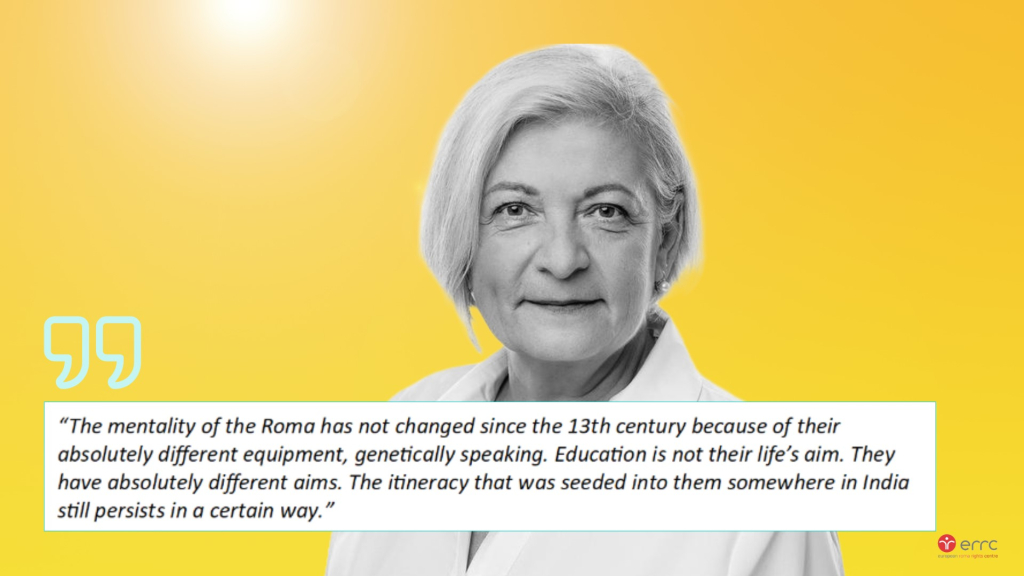Czech vice-mayor forced to resign over racist remarks: now it’s time to dismantle racism!
20 January 2025

A new year controversy erupted in the Czech Republic, after Romea.cz reported racist remarks made in a press interview by vice-mayor Alena Pataky, which prompted her subsequent resignation. Pataky, vice-mayor of the Municipal Department of Moravská Ostrava and Přívoz, member of the ANO party, and a ‘social educator’ said:
“The mentality of the Roma has not changed since the 13th century because of their absolutely different equipment, genetically speaking. Education is not their life’s aim. They have absolutely different aims. The itineracy that was seeded into them somewhere in India still persists in a certain way.”
Pataky’s statement that Romani pupils' low success rate in primary school today is their allegedly different genetic inheritance and ‘mentality’, prompted swift and damning criticism from many quarters. Štefan Balog, manager of the ROMEA organization’s scholarship program described Pataky’s remarks as pathetic and nonsensical, and called for a public apology and the vice-mayor’s resignation. Miroslav Klempár, founder of the Awen Amenca organization stated,
“Madame Vice-Mayor has insulted all the Romani parents with whom we have been collaborating who do take care to provide their children with a good education. She has spat in the face of all respectable Romani people in an indiscriminate, arrogant way worthy of a Nazi dignitary.”
Even ANO party chair, Andrej Babiš – hardly one of the country’s progressive voices – found Pataky’s remarks totally unacceptable, and added that “I don’t understand in the least how anybody can say something of the sort and I fully understand that many people have been hurt by it.” As reported by Romea.cz, even as Pataky apologized for hurting people’s feelings and her ‘unfortunate turn of phrase,’ she doubled down on her views and declared she had no intent to resign.
However, within a day, following the wave of criticism Pataky resigned her post on 6 January. For some, this outcome sent a new signal about what can be said about Roma in the public sphere in the Czech Republic. A less sanguine take came from Gwendolyn Albert and Jan Húsak who wrote that
“Her resignation would be an example of taking political responsibility if we lived in an ideal world. However, in reality it is more an exceptional episode in Czech politics, where such deeds and words frequently have no such repercussions.”
However, this episode comes after last year’s adoption of a formal definition of antigypsyism by the government. In an optimistic vein, Government Commissioner for Human Rights, Klára Šimáčková Laurenčíková stated on 8 April 2024, “the adoption of this definition unequivocally set the boundaries of courteous, correct behaviour and unambiguously states what is not acceptable in our society.”
This formal recognition of antigypsyism finally came in the wake of decades of international criticism of racism in the Czech Republic. In her 2023 visit, Council of Europe Commissioner Mijatović stated that many of the issues of anti-Roma discrimination and social exclusion she identified were “underpinned by the antigypsyism that remains prevalent in Czech society”. She echoed ECRI’s concerns about a "growing trend towards xenophobic populism in the Czech Republic”, and the frequency of racist anti-Roma hate speech in the public sphere and media, including by national and local politicians.
Segregation is more than an abuse of human rights …
Vice-mayor Pataky’s ‘unfortunate turn of phrase’ shone a light on the racist mindset of many educators in the Czech Republic, and served as a reminder that so little has been done to desegregate the school system. More than 17 years after the judgment of the European Court of Human Rights in the case of D.H. and Others v. the Czech Republic, Commissioner Mijatović found that progress remained minimal, and that there had been “no reduction of Roma pupils in special classes, nor of their segregation within regular classes and schools, over the past five years.”
In October 2024, the European Commission sent an additional letter of formal notice to address the disproportionate, systematic assignment of Romani pupils into separate schools for children with disabilities; and “urged CZECHIA to comply with EU law guaranteeing equality between persons irrespective of racial or ethnic origin”, noting that the first letter of formal notice on the issue of school segregation was sent to the Czech authorities ten years ago.
With the passing of every year, new groups of Romani children are enrolled into systems structured to fail them; systems structured to deny them equal opportunities in a manner that will blight their life chances forever. Segregation is more than an abuse of human rights. It amounts to a willful and malicious squandering of Romani communities’ most precious assets – the intellectual capacities of future generations.
Recognition of racism needs to be followed by dismantling racist structures
The Czech government’s official definition of of the term ‘antigypsyism’ embraces both the words and deeds of individuals and the practices and strategies of institutions to exclude Romani people, devalue their culture, and incite violence against them. The stated purpose was “to aid the authorities to get a better grasp of this specific form of racism so they can better respond to it.”
Some might say that after decades of structural racism, segregation and sterilisation, the Czech authorities have a very fulsome grasp of what it takes to discriminate against Roma and are more than familiar with the specifics of antigypsyism.
The onus now is on the authorities to prove that Pataky’s resignation is more than an ‘exceptional episode’. Beyond the long overdue first steps of recognition of antigypsyism, the ethical imperative must be to effectively combat structural discrimination, repair the damage done by racism, and bring a final end to the racial segregation of Romani pupils.




